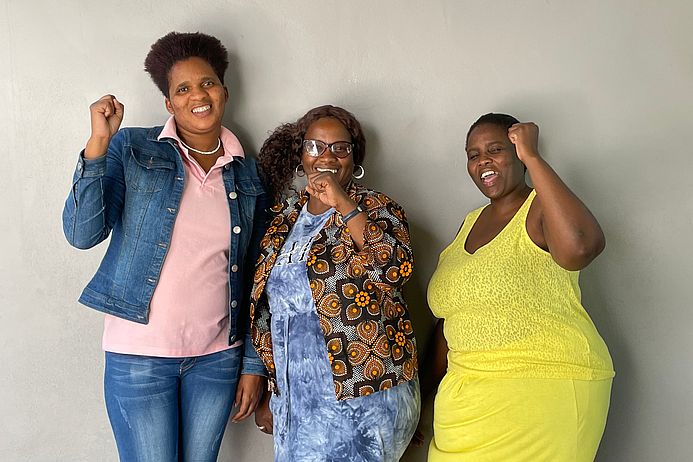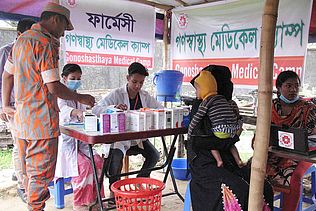The pandemic might have been declared "over". However, the struggle of the Community Health Workers (CHWs) continues. In South Africa, thousands of CHWs did not only fight against the Covid pandemic: they still fight against the ongoing pandemics of neoliberal austerity, poverty and domestic and gender-based violence. And they fight for fair and dignified working conditions for those with the weight of caretaking for community health.
Having successfully won a year-long litigation against the government in South Africa's Province of Gauteng, demanding permanent positions for CHW in the health sector, five different provinces followed. They organized and wrote a letter to the health ministers. Instead of a reply, the ministry sent in the police, who used rubber bullets to evict the women. Since then, their determination has been all the stronger. With the precedent of the Gauteng litigation case, they are preparing a court case to demand dignified working conditions in all provinces. All CHWs know that the case will take a long breath. Meanwhile, they continue their hard work on the ground, based on an understanding of care as substantial for community health and social change.
We spoke with Boniwe, Bulelwa and Ntombetemba, chairwomen of the CHW's self-organization in three different provinces, about the relationships of care for their work and lives and the significance of this litigation for their struggle
What does the legal case mean to you?
Ntombetemba: It means a lot. We have been fighting a lot, organizing marches, and sitting with the stakeholders from the Department of Health. CHW in the Western Cape needed to be organized. Now we see with the legal case that the CHWs have been empowered and started community organizing. It gives us strength, it gives us power and hope.
Boniwe: For me and for us as CHW, the legal case is the key to everything. If we win this case, we will be permanent, and we will finally receive benefits and be recognized as permanent workers.
Bulelwa: To me and to the whole care worker community, this case is what we have always been wishing and dreaming for. It takes a lot of time to take on the government, and we only had the resources for a short time. And now, it seems as if our dream is coming true.
What would happen to the communities and the health system if Community Health Workers were not there?
Bulelwa: Without us the system would collapse. The vital work of primary health is done by CHW. We are the ones giving out information. If there is an outbreak of a particular disease, for example, Covid-19, we explain it to the people. Today in South Africa, 48% of people have been vaccinated against Covid-19. Without CHW, I don't believe the communities could have been reached. Because we were the ones that were going door to door - we went to churches, carried out community outreach programs. It was us to spread the word, which is how the information got everywhere. I can only picture a functioning healthcare system with CHW.
Ntombetemba: The same everywhere: People would have to wait very long in the hospitals before receiving care. The clinics would also be overloaded. It also means that more people in the community would die. As CHWs, we are the backbone of the communities. It is us who have set up the care system inside the communities. We raise awareness, organize campaigns and educate about non-communicable and communicable diseases.
Boniwe: People have been ill for more than 5 or 10 years, but getting hope for them started with us checking and regularly caring for and supporting them.
What does “care” mean to you?
Boniwe: Let me describe something. We take care of families. Sometimes you will find family members who are HIV-positive. Others even have Tuberculosis. It's dangerous because the risk of contracting TB is very high. Even though the Department of Health pretends measures to protect us, we didn't receive any of those. So, some of us have been getting TB. We are used to this danger and don't have alternatives. If we would stop the work we're doing, we would be failing our families and community. Care for me, therefore, means working. Because we care for people and we want to see others doing well. We work so that the diseases out there do not harm our communities.
Bulelwa: Care work is doing change. It is close to my heart. If babies were not immunized, they would die before they turn one. And if your kids were to die before they turn 1, it would mean that not even one person could reach the age of 50. Care improves the quality of life. If I'm physically well, I can be well emotionally also. If I'm physically ill, I will also cause emotional illness. And vice versa. If you want to cure the community, if you want to cure the people, you must not limit them to care. You even paralyze them by limiting them to care.
Ntombetemba: Care for me means to care for those who cannot help themselves or don't have others. It includes patients who har in the hospices and those in palliative care or hospital. Sometimes CHWs even organize food and money in the communities or try to bring in other organizations to support basic necessities. Because it is also a part of healthcare. It is my passion to care for the environment I'm working in. It is about loving the people that I work with. Caring is taking someone to render services in their communities.
What gives you the hope to continue with your activist struggle and hard work?
Ntombetemba: It is our hope that one day, the Department of Health will recognize the importance of our work. They see that the work we do is more than what the nurses in the hospitals do. Because we care for anyone, the post-natal child is the same as the person using drugs. In a sense, we are social workers, psychologists and physicians. If the patient doesn't already get a grant, we refer them to the Department of Social Development. If the patient doesn't have an ID, we refer them to home affairs. If the patient has no house, we refer the person to the housing projects.
Boniwe: I'm working in a clinic as a counsellor. Sometimes patients come to me and say, 'I don't care anymore. I want to die. HIV can kill me.' Then I sit down with that person. Although we know that HIV is a disease for which no cure has been found so far, one can live a long life. I always try to bring hope to my client. You cannot live a life without hope. If you don't have hope, life doesn't have any meaning. Also, we, as CHW, hope that we will be absorbed one day. When hope is there, change will happen.
Bulelwa: I stand up for my right. I'm not a politician. I'm an activist. I raise awareness about different issues, which makes me an eye-opener. A politician will say they will do one thing but never do it. For us, that's different. We don't just speak. We act. That means I bring change to the community. Reflecting back on the year 2020, when the pandemic broke out, there was no hope, and everyone was scared. It was dark. But in the end, we managed. Now, we're out of danger for the moment. The pandemic is over, and we will learn to live with it.



